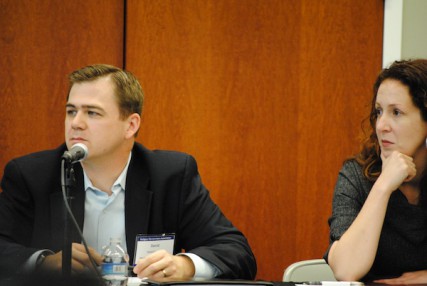
BETHESDA, MD — At a panel discussion on Thursday at Wesley Theological Seminary, scholars and journalists agreed that presidential candidates should — and are expected to — talk about their personal religious beliefs.
Panel moderator, Shaun Casey, said Mitt Romney and Barack Obama have avoided talking about their faith and asked how much journalists should probe about their beliefs, and how to ethically go about doing so.
Bill Keller, of the New York Times, said, what’s more important than a candidates theology, is how they’ll use those beliefs to govern the country.
If a candidate believes a sacred text overrides the U.S. Constitution, for example, that’s something Keller says voters need to know.
“I don’t think religious views should disqualify a candidate, but we’re entitled to ask what a candidate believes,” he said.
Melissa Rogers, of Wake Forest Divinity School, said reporters need to get more personal and find out candidates faith stories. She said visiting with Michelle Bachman about her Evangelical beliefs, for instance, helped her understand “what was essential to this person.”
“I think it illuminates who they really are,” she said, “and we have a lot to learn.”
The New Republic’s Amy Sullivan, however, said what matters is how a candidate would lead the country, noting there are ways to find that out without make it a faith issue.
“I don’t care what their motivation is, I just care where it ends up,” she said.
David Campbell, of the University of Notre Dame, said the matter of faith and politics won’t end with the 2012 election. He said most Americans are comfortable with religious beliefs other than their own (except, perhaps, for Islam and Buddhism), though he wonders how voters would feel about electing an openly secular candidate.
“I’d suggest that day is not too far off,” he said.
Readers, what do you want to know want to know about the presidential candidates theological beliefs?






